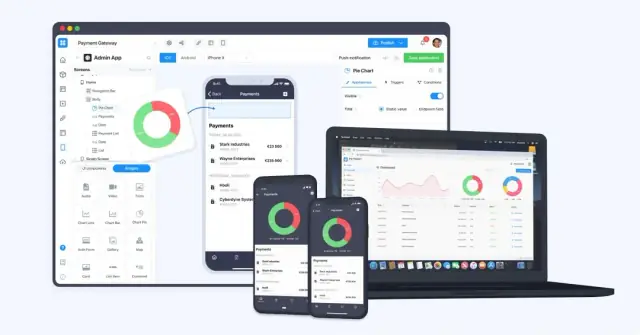How to Create Smart Learning Apps with AI App Builder?
Discover how to leverage AI app builders to design intelligent learning apps for education with personalized content, enhanced data analysis, and adaptive learning systems.

Smart learning apps, powered by artificial intelligence (AI) technologies, have changed the education sphere by offering personalized and engaging learning experiences. These apps employ advanced algorithms and machine learning to analyze student performance, identify knowledge gaps, and tailor content to meet individual learning needs.
AI-driven learning tools are being used across various educational institutions, including K-12 schools, higher education institutes, and professional training organizations, offering seamless delivery of instructional material, assessments, and engagement tools. With the rising popularity of eLearning and the ongoing integration of AI in education, smart learning app development has become a highly sought-after field.
Importance of AI in Education
AI has the potential to revolutionize education, facilitating personalized learning, enhancing data analysis, enabling adaptive learning systems, and fostering efficient communication between educators and students. Here are some ways AI plays a crucial role in modern education:
- Personalized Learning Paths: AI-powered apps can analyze learners' strengths, weaknesses, and preferences to create tailored study plans, allowing students to learn at their own pace and improve their understanding of complex topics.
- Automated Assessment & Feedback: AI can automatically grade assignments, quizzes, and other assessments, saving teachers time while providing instant feedback to students. This efficiency allows educators to focus on developing lessons and supporting students.
- Data-Driven Insights: Through data analysis, AI can identify patterns in student performance, helping educators understand and address their students' specific needs, interests, and learning styles. This information can enhance instructional design and provide targeted support to learners.
- Intelligent Tutoring Systems: AI-based tutoring systems can deliver personalized feedback, hints, and support, allowing students to learn from their mistakes and develop a deeper understanding of concepts. These systems can also adapt teaching methods to ensure the most effective learning experience.
- Better Communication & Collaboration: AI-driven platforms can facilitate seamless communication between students and teachers, breaking geographical barriers and offering diverse opportunities for collaboration and engagement.
Considering the numerous benefits AI brings to education, developing a smart learning app has the potential to impact learners and educators worldwide significantly.

Choosing the Right AI App Builder
Developing a smart learning app can be complex, but selecting the right AI app builder can make your task much easier. Several platforms offer app-building services, but not all are equipped to handle the complexities and requirements of AI-powered learning applications. Here are some factors to consider when choosing an AI app builder:
- Intuitive User Interface: The app builder should offer a user-friendly interface that simplifies the app development process. Drag-and-drop features and other visual aids can make designing app layouts, workflows, and interactions more manageable for both technical and non-technical users.
- AI Integration: Ensure the app builder supports integrating AI technologies such as machine learning models, natural language processing (NLP), and computer vision. This is vital for personalization, analysis, and automation within your learning app.
- Scalability: As your app's user base grows, so do its resource requirements. Choose an app builder that allows you to deploy scalable applications that can handle increased data processing and user traffic without compromising performance.
- Data Management & Security: Your learning app will handle sensitive student data, making data security a top priority. The app builder should offer powerful data management and security features to protect your users' data from unauthorized access, breaches, and other threats.
- Flexibility & Customization: The best AI app builders provide flexibility in design, allowing you to create custom app features, workflows, and data structures that cater to the unique requirements of your learning app.
- Support for Multiple Platforms: Your learning app should be accessible on various platforms, including web, Android, and iOS devices. The AI app builder you choose should support cross-platform development and deployment, ensuring your users have a seamless experience no matter their preferred device.
- Documentation & Support: Comprehensive documentation, tutorials, and customer support can drastically improve your app building experience. Opt for a platform that offers readily available guides and resources to help you build and maintain your smart learning app effectively.
By considering these factors and assessing your app development needs, you can choose the right AI app builder platform that simplifies and streamlines the development process, allowing you to create a superior smart learning app.
How to Create a Smart Learning App with AI App Builder
Creating a smart learning app with an AI app builder involves several steps that ensure your application is efficient, user-friendly, and meets the needs of educators and learners. Here are the main steps to follow:
- Define the purpose and target audience: Identify the primary purpose of your app, such as assisting in language learning, mathematics, or test preparation. Determine your target audience, considering age group, learner skill levels, and educational background.
- Select an appropriate AI app builder: Choose an AI app builder that supports building smart learning applications, has an easy-to-use interface, and provides AI-powered features like natural language processing and machine learning capabilities. Consider no-code platforms like AppMaster that simplify app development.
- Create a responsive and intuitive UI/UX design: Design user interfaces that cater to various screen sizes and devices like smartphones, tablets, and web browsers. Optimize UI/UX for ease of use and ensure smooth navigation, attractive visuals, and an engaging experience.
- Incorporate AI-powered features: Leverage AI technologies like natural language processing, machine learning, and voice recognition to create personalized learning experiences, analyze user data, and deliver adaptive content based on learner performance and preferences.
- Build the backend infrastructure: Develop a backend system that supports scalable server architecture, secure data storage, and seamless communication between app components. Use no-code platforms like AppMaster to visually develop the backend with a drag-and-drop interface.
- Integrate third-party tools and APIs: Enhance your app functionality by integrating external tools such as payment gateways, chatbots, and analytics services. Use AppMaster APIs to streamline integration and ensure smooth interoperability between app components and external services.
- Test and optimize the app: Thoroughly test and optimize the app for performance, usability, and reliability. Identify performance bottlenecks, fix bugs, and enhance user experience through iterative testing and optimization.
- Publish and deploy: After testing and finalizing the app, publish it on app stores like Google Play and the App Store or deploy it as a web application. Use AppMaster’s seamless deployment features to publish the app with minimal effort.
- Monitor and update: Continuously monitor user feedback and usage metrics to identify areas for improvement, make updates based on user needs, and roll out new features to keep users engaged and enhance the learning experience.
AppMaster: A Comprehensive No-Code Tool for AI App Development
As a powerful no-code tool for creating apps, AppMaster simplifies the process of developing AI-powered smart learning applications. With AppMaster, you can visually design backend, web, and mobile applications through an intuitive drag-and-drop interface. AppMaster also offers extensive customization options, allowing developers to create unique and engaging learning experiences without writing a single line of code. Some key advantages of using AppMaster for AI app development include:
- Visual backend, web, and mobile application development: AppMaster’s visual design environment eliminates manual coding and accelerates app development by automating complex tasks with a simple drag-and-drop interface.
- Customizable business processes and APIs: AppMaster enables you to design custom business processes through its powerful Business Process Designer and build extensive APIs for seamless integration with external tools and services.
- Secure and scalable infrastructure: Build applications with a strong backend architecture that ensures security, scalability, and high performance. With AppMaster, you can deploy your applications to the cloud or host them on-premises using source or binary files.
- Efficient collaboration and rapid development: AppMaster streamlines collaborative app development, allowing teams to work together efficiently and test their applications quickly with autogenerated applications and open API documentation.
With its extensive features and capabilities, AppMaster empowers professional and citizen developers to create scalable and engaging AI-powered smart learning apps easily.

Key Features to Include in a Smart Learning App
To create a successful AI-powered smart learning app, consider including the following key features:
- Personalized content: Leverage AI algorithms to analyze user data and behavior, enabling the app to deliver tailored learning experiences and content based on individual learner preferences and performance.
- Adaptive learning pathways: Integrate AI-driven adaptive learning systems that automatically adjust the learning pace and content based on learner progress and understanding, ensuring an optimal learning experience for each user.
- Analytics and reporting: Provide detailed analytics and reporting tools that help educators and learners gain insights into performance, progress, and areas that need improvement. Incorporate machine learning to continually refine and adapt based on user data.
- Gamification elements: Incorporate elements of gamification, such as rewards, badges, and leaderboards, to motivate users and improve engagement while learning. Utilize AI and machine learning to provide personalized feedback and suggestions for improvement.
- Chatbots and voice assistants: Integrate AI-powered chatbots and voice assistants that support natural language processing to assist learners in answering questions, providing explanations, and offering personalized learning support.
- AR/VR capabilities: Leverage augmented reality (AR) and virtual reality (VR) technologies to create immersive and interactive learning experiences, allowing students to visualize complex concepts and interact innovatively with learning materials.
- Collaboration tools: Enable seamless communication and collaboration among educators, learners, and peers through integrated messaging systems, forums, and project management tools.
- Security and privacy: Implement strong security measures and data protection practices to safeguard user data and privacy, ensuring a secure and trustworthy learning environment.
By incorporating these features and leveraging the powerful capabilities of AI app builders like AppMaster, you can create a compelling, user-centric smart learning app that revolutionizes how students learn and engage with educational content.
Examples of AI-Powered Smart Learning Apps
There are several notable AI-powered learning apps available today that have made a significant impact on the education sector. These apps showcase how artificial intelligence can enhance the learning experience for students by offering personalized content, adaptive learning pathways, and sophisticated analytics. Here are some examples:
- Duolingo: Duolingo is a language learning platform that offers personalized lessons to help learners effectively and efficiently build their language skills. It utilizes AI-driven algorithms to tailor lesson plans, gauge learner's abilities, and adjust content based on the user's progress. Its intelligent chatbot feature, which simulates conversations with native speakers, assists learners in practicing and improving their conversational skills.
- Brainly: Brainly is an online learning platform where millions of students collaborate and assist each other in answering questions related to various subjects. AI algorithms analyze the questions students pose, match them with relevant topics, and connect them with students or experts who can provide the most suitable solutions. This AI-driven approach has made Brainly a popular and reliable resource for academic support.
- Quizlet: Quizlet is a study platform designed to help students with their exam preparation by offering interactive study sets, practice quizzes, and learning games. It employs AI to analyze each user's learning patterns, curate personalized content, and implement adaptive learning systems to improve learner engagement and performance.
- Socratic by Google: Socratic is an AI-powered educational app that provides students with subject-specific guidance and support. It uses advanced AI models to analyze complex questions, identify underlying concepts, and curate explanatory resources and problem-solving steps. Socratic's intelligent search functionality makes it an invaluable tool for students seeking clarification on various subjects.
- Thinkster Math: Thinkster Math is an iPad app that combines AI-driven technology and human expertise to offer personalized math tutoring for students. The app's AI algorithms evaluate the students' learning styles and progress, tailoring the curriculum accordingly. It also provides in-depth analytics and feedback, allowing parents and tutors to monitor the students' improvement and understanding of mathematical concepts.
These AI-powered learning apps exemplify the potential of artificial intelligence in enabling personalized and efficient education. By leveraging the power of AI, educators and developers can create a new generation of innovative learning solutions.
Final Thoughts
Creating smart learning apps with AI app builder tools, such as AppMaster, can revolutionize the education industry by providing personalized, engaging, and effective learning experiences. As we have seen, AI-powered learning apps allow for tailored content delivery, adaptive learning systems, advanced data analysis, and enhanced communication between educators and students.
AppMaster's comprehensive no-code platform simplifies the development of AI-powered learning apps, offering visual design capabilities for backend, web, and mobile applications, in addition to drag-and-drop tools and customizable business processes. These features enable developers to focus on incorporating the advanced AI functionalities needed to create truly intelligent learning apps that can change how students learn and interact with educational content.
Take your first step towards designing smart learning apps by exploring AppMaster's powerful no-code platform and contribute to shaping the future of education.
FAQ
An AI app builder is a tool that leverages artificial intelligence to simplify the process of creating applications. When applied to the realm of education, these builders enable the development of smart learning apps that can offer personalized, interactive, and adaptive learning experiences.
Features may include natural language processing, machine learning, personalized content delivery, analytics for tracking student progress, and the ability to create interactive quizzes, games, or simulations.
AI app builders can analyze individual students' learning patterns and adapt the content to match their pace and preferences. This leads to a more engaging and effective learning experience.
AI app builders are versatile and can be used for various types of learning apps, from language learning to mathematics and science education. They excel in scenarios where personalized learning is crucial.
Yes, AI app builders are valuable tools for educational institutions. They can be employed for in-class learning or in e-learning platforms, making them suitable for a variety of educational settings.
AppMaster, a versatile no-code platform, empowers educators and instructional designers to create smart learning apps without the need for extensive coding skills. It offers a range of AI-driven components and features, making it a valuable tool for developing interactive and personalized learning experiences.





